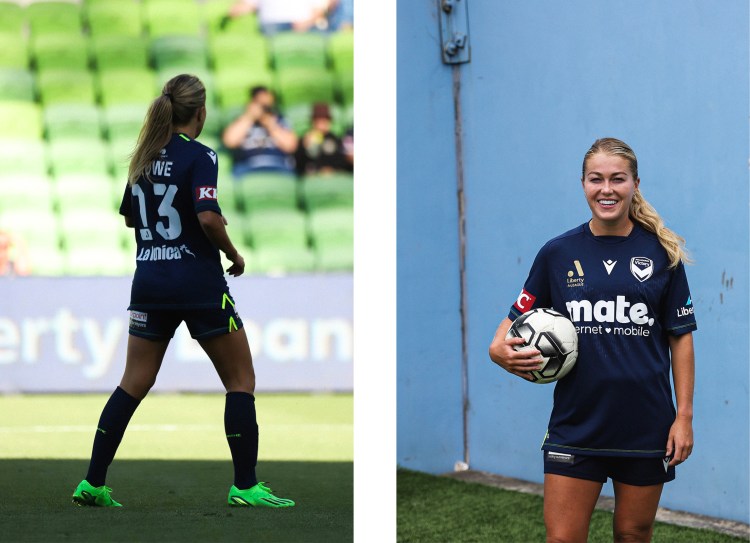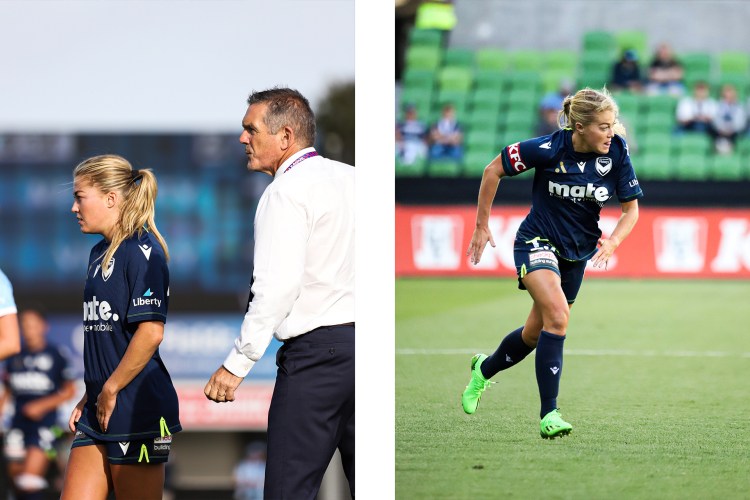Sarah Rowe’s professional sporting CV is seriously impressive, having played at the elite level across three codes: Football, Australian Rules and Gaelic Football.
She’s represented her nation at football’s international level, her home County on Gaelic football’s biggest stage, Collingwood in Australia’s AFLW, and she now wears the Navy Blue of three-time A-League Women Champions, Melbourne Victory.
Born in the north of Ireland in Ballina of Mayo County, Rowe grew up alongside her two older sisters Lorna and Fiona, Mum Grainne and Dad, Alan.
The Rowe family has a history of sporting success. Sarah’s Grandfather, Paddy Jordan, was a member of Mayo’s 1951 All-Ireland winning team, the last team to bring All-Ireland success back to Mayo.
“Sport was always a really big part of our family,” Rowe says.
“In 1951, it was the last time Mayo won an All-Ireland – my Grandad was on that team.”

“They haven’t won since, they’ve been in numerous All-Ireland finals since, but have never won.”
Rowe was to follow in the footsteps of her Grandad Paddy in 2017 after she returned to Gaelic football, looking to bring All-Ireland success back to Mayo.
Unfortunately, it wasn’t to be as Sarah’s Mayo side was defeated by Dublin, as the search for All-Ireland glory continued.
Between the ages of nine and twelve-years-old, Rowe’s School Principal, Hugh Lynn, became a major influence.
Lynn pushed Sarah to try new things, including emphasising the importance of using both feet if she was to continue the journey to become a professional athlete. Lynn also shared some crucial life lessons.
“He was incredible,” Rowe recalls. “As a young kid growing up, you definitely need to be taught hard lessons early – because they stick with you.
“Even from a young age, the girls would be playing the boys, I was never allowed to use my right foot, my natural foot – I always had to use my left, everyone else could use whatever foot they wanted. He obviously saw something in me, and wanted me to reach my potential.
“I used to be like ‘This is so unfair!’, like, I just wanted to win the game.”

Lynn’s lessons continued, encouraging and signing Rowe up for cross country.
“He used to say to me ‘You have to compete in the cross country’ and I was like ‘I don’t want to compete in the cross country, I want to play soccer and Gaelic’.”
“He’d say ‘If you want to be a good soccer or Gaelic player, you have to be the fittest player on the field’.”
“And I’d be like ‘Nope. No thank you’.”
The year after, Lynn’s messages took on new importance as Rowe matured and began to take on board the advice she previously had not wanted to hear.
“He was making me resilient in everything I did, and I couldn’t thank him enough for that. I was a kid who argued with him, because sometimes I thought I knew better than him.”

Another influential figure while growing up, and to this day, is Sarah’s Dad Alan.
“My dad has worked between China, Ireland, works a bit in Australia. He has probably demonstrated a lot, hard work to me my whole life, I’ve seen him work so hard. My mum also – she’s a nurse.”
Alan works with his brothers in clothes manufacturing in a family-owned business, and has done so since Sarah was a child.
“While he was away (when Sarah was a child), he never seemed to miss anything – it was like he prioritised everything around my sport.”
“He manages to make it work, while being away, he’s still the most proactive dad ever, I actually don’t know how he does it. So, what I’ve always taken from him and the life that he lives – is that anything is possible.”
Balancing her various commitments with a personal life outside of sport was a constant juggling act. Friendships were tested and schedules were pressed, setting up boundaries from a young age to remain dedicated to sport.
“I basically played both sports (football and Gaelic football) growing up the whole way, and I was constantly trying to balance the two – it always got really hard.”
“I remember having to explain it to my friends and say ‘I’m so sorry that I can’t make your birthday, but I have to go to training’, and it was always that way.”
“It was a thing, that as a young kid, I felt so bad when I missed a soccer game for a Gaelic game, I’d prioritise a final over a league game – that was just the way it always worked.”
Rowe first came to Australia in 2018, when Collingwood’s AFLW team scouted her during another stint of Gaelic football back home in Ireland.
It was during a trip home to Ireland two years ago during the peak of the Coronavirus, which reignited Rowe’s passion for football.
“I emailed Jeff, and we had a chat, and then I was like I’ll come in and have a proper chat with you.”
“He did not need to give me any chats at all.”
“The thing is, because I’ve been transitioning through sports, I always know the first few weeks are hard because you’re not where you want to be.”
A heavy focus on technical work was in order, working individually with Victory’s coaching staff to rejig the muscle memory involved with football.
“All I have to do is be persistent and consistent with everything I’m doing, and I have to know that I will get better.”
“It’s that whole thing of being comfortable with being uncomfortable, and being like, this is not going to be straightforward, it’s not going to happen for me like that (instantly).”

“The last few weeks have been so good, and the biggest thing for me is, I get so much enjoyment from playing soccer and I’m just so grateful for the opportunity.”
Rowe has made an appearance in all but one of the games she has been involved since she signed in the early stages of January.
Thursday’s clash with Sydney FC is Melbourne Victory Women’s next challenge. A win will go a long way to securing Victory’s spot in the finals, something Rowe will be aiming to achieve in her first season at the Victory.




